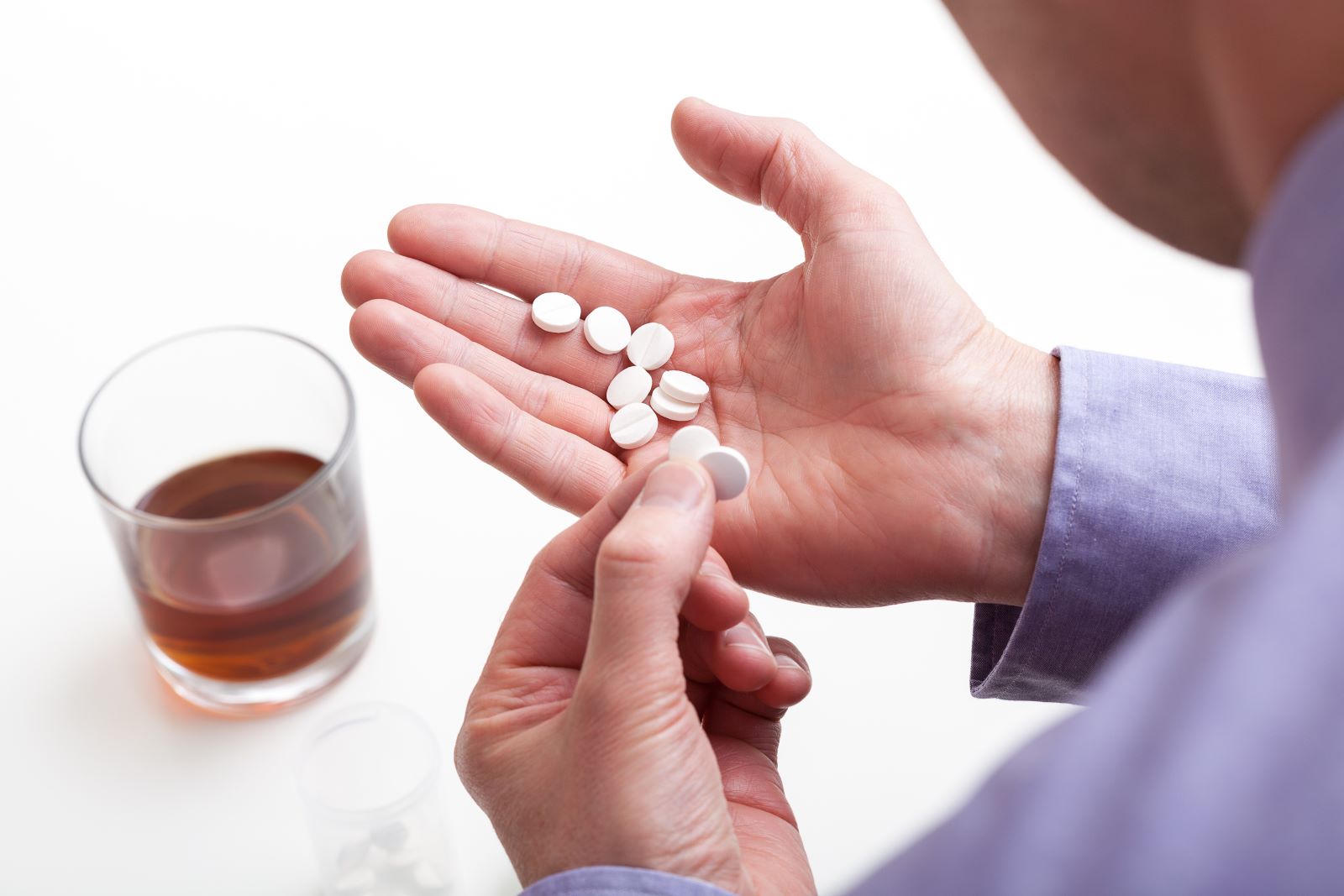Table of Contents
Risks of Using Xanax with Alcohol
Mixing Xanax and alcohol can be very harmful. Both are depressants, meaning they slow down the brain. When taken together, they can make you feel extremely sleepy and dizzy, and may even lead to serious breathing problems. This combination can also make it hard to think clearly or remember things, increasing the chance of accidents or injuries.
Using Xanax with alcohol can also lead to severe side effects like confusion and poor coordination, which can be dangerous. It’s important to talk to a doctor before considering drinking alcohol while taking Xanax. This can help you avoid risks and keep you safe.
Most people understand that mixing drugs can be dangerous, but it’s relatively rare for people to understand how dangerous mixing certain drugs can be, or which drugs are more dangerous to mix than others.
For instance, the cultural perception that alcohol is a relatively safe and acceptable drug to use can lead a lot of people to think it’s safer to mix with other drugs, both prescription and recreational than it is.
Those misperceptions can’t just cause serious complications for users, they can also be deadly.
Even if you’re taking one or more of the drugs you’re mixing legally, like in the case of combining prescription Xanax® and alcohol, it can still be extremely dangerous. Xanax® and alcohol are actually a perfect example because of how serious the effects can be when these drugs are mixed together, and how dangerous it can be when you don’t get medical help quickly enough.
Unfortunately, studies on Twitter [1] and other social spaces show that there are still a lot of people polymixing drugs (taking 2 or more drugs simultaneously on purpose) and these people often don’t understand the risks involved.
So, to help people better understand why mixing drugs like Xanax® and alcohol isn’t a good idea, and what you should do if you’re having serious side effects or want to mix Xanax® and alcohol, let’s take a closer look at this common problem, why it happens, and what it can do to you.
What Are the Side-Effects Of Xanax® and Alcohol?
One of the first things you need to know about mixing drugs is that when you mix them you’re still risking all of the normal side effects from each drug.
That means that you need to know what the side effects are, individually, so that you can look for shared side effects and side effects that, on their own, are risky together.
At the same time, you should also know that mixing drugs can cause drug interactions where one or both drugs acts differently than they normally would. Often, as is the case with Xanax® and alcohol, the drug interactions from mixing two substances are dangerous.
We’ll talk about what happens when you mix Xanax® and alcohol in the next section. For now, let’s look at the possible side effects when you take these drugs individually.
Common side effects [2] from Xanax® include:
- Drowsiness
- Fatigue
- Falling asleep
- Blurred vision
- Insomnia
- Memory problems
- Irritability
- Diarrhea
- Weight changes
- Constipation
- Trouble concentrating
- Headache
- Sweating
- Nausea
- Vomiting
- Muscle weakness
- Swollen hands and feet
- Congestion
- Lowered libido
It’s important to remember that not everyone will get side effects from Xanax®, and not all people who get side effects will get the same side effects every time they take Xanax®. People who use Xanax® recreationally may be more likely to get side effects than people who are using Xanax® as prescribed. Higher doses or longer use of Xanax® may increase the risk of side effects as well as increase the severity of side effects when you get them.
You should also know that even with as many side effects as we listed there, there is always a possibility that you may have a rare or unexpected side effect, even when you aren’t mixing Xanax® and alcohol. If you have a severe side effect and are worried about your symptoms, call poison control, a nurse helpline, or 911 for more help.
Now that we’ve talked a bit about Xanax®, let’s talk about the side effects of alcohol use.
Remember, like the side effects of most drugs, the longer you use alcohol, the more often you use it, and the more you drink when you use alcohol, the worse your side effects are likely to be.
Long-term chronic alcohol users may have more side effects and will generally have more severe versions of the side effects, compared with people who only drink occasionally or who haven’t had alcohol before.
Drinking smaller amounts of alcohol at once reduces your risk of side effects, including alcohol poisoning, and will generally mean that the side effects you get from drinking will be less severe than if you drank more.
With all that out of the way, here are some of the common side effects [3] of alcohol use:
- Euphoria
- Headache
- Impaired vision
- Impaired movement
- Impaired speech
- Changes in cognition
- Impaired memory
- High blood pressure
- Increased risk of heart disease
- Increase risk of cancer
- Stroke
- Weakened immune system
- Agitation
- Aggression
- Lowered inhibitions
- Drowsiness
- Inability to stay conscious
- Nausea
- Vomiting
- Dizziness
- Sweating
You might notice that there are quite a few shared side effects between Xanax® and alcohol. That’s one of the first indicators that two drugs might work in similar ways, or be dangerous when taken together.
Of course, there’s another big reason that mixing Xanax® and alcohol isn’t a good idea. More in the next section.
What Happens When You Mix Xanax® and Alcohol?
Before we talk more about what happens when you mix Xanax® and alcohol, you need to know that Xanax® is a benzodiazepine. Benzodiazepines are typically prescribed to help manage anxiety and work in part by slowing your central nervous system and giving your brain and body a chance to catch up and use coping mechanisms to intervene in anxiety.
This is important because, like other downers or depressants, benzodiazepines aren’t safe to mix with alcohol. No drug in this class should be combined with alcohol.
The other thing you need to know is that alcohol can actually increase your symptoms of anxiety and make them harder to manage. So, if you’re taking Xanax® or another benzodiazepine for anxiety, drinking alcohol would be counterproductive even if it weren’t outright dangerous.
When you mix Xanax® and alcohol there are a few things that happen. For one thing, the two combined may have more severe side effects, and you may feel the effects of the Xanax® more strongly than you normally would.
Additionally, your liver and kidneys have an additional challenge since they now have to filter two substances from your body, which will likely take longer than it would for either drug alone.
You’re much more likely to reach toxic levels or to have a med interaction that’s dangerous when you combine the two.
1-2 drinks while taking Xanax® might be okay, depending on your tolerance, how fast your drink them, and the dose of Xanax® you’re on. Talk with your doctor or pharmacist to find out more.
But drinking more than that is likely to be dangerous thanks to the risk of dangerous interactions, longer duration of both drugs in your body, and the potential for a dangerous combination of side effects.
Signs You May Be Struggling With an Addiction
Both of these drugs are potentially addictive, which makes it doubly important to watch for signs of addiction.
Some common signs of addiction include:
- Craving Xanax®/alcohol when you wouldn’t normally use either.
- Starting to drink more / take more of the drug than prescribed, especially if you need to take that much regularly
- Increased side effects don’t stop you from taking/drinking more.
- Friends and family seem concerned about your alcohol or Xanax® use
- You feel like you need to hide your drinking/prescription
- You shop around for doctors to prescribe more
- You feel like you need to lie about your drinking habits, particularly to doctors
- You don’t feel like yourself unless you have Xanax® and alcohol
- You avoid people knowing how much you’ve had
If any of those signs and symptoms sound familiar to you, especially if they’re combined with lower moods or worse performance at work/school, you may be dealing with an addiction.
The good news is that you aren’t alone, and some resources can help you overcome an addiction if you do have one.
How To Get the Help You Need For an Addiction
If Xanax® and alcohol use feels out of control, or you feel like you’re getting increasingly more desperate between doses, or are dealing with worse and worse moods over time, it may be time to get help.
Addiction is complicated and difficult to deal with. Addiction on top of a mental health diagnosis like an anxiety disorder can be even harder to manage on your own, especially when you don’t know what treatment options are available to you.
It’s a good idea to talk to your doctor about your concerns, especially if you have a Xanax® prescription. They may be able to recommend effective options that will help you control your anxiety while also dealing with your addiction.
But, with complicated addictions like these, you may also want to reach out to a specialized treatment center, especially if the addiction started young or other complicating factors could make it harder to recover.
Treatment centers come with the added assurance that you’re getting as much support as possible, and the isolation to make sure you’re able to focus on recovery and learning how to live a healthier lifestyle without the addiction.
Related Articles
- Does Alcohol Thin Your Blood? | Learn About Alcohol & Health
- Xanax® and Alcohol | The Dangers of Mixing Xanax® and Alcohol
- Antidepressants and Alcohol | Should You Mix These Substances?
- Alcohol & Drug Rehab for Teens in Dallas, TX
- Relapse Prevention Program & Therapy | BasePoint Academy
- Dual Diagnosis Treatment Center for Teens and Adolescents in Dallas, Texas


